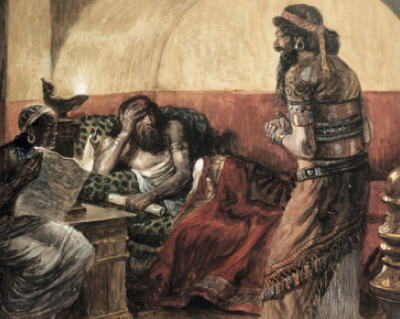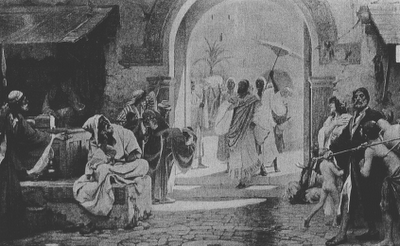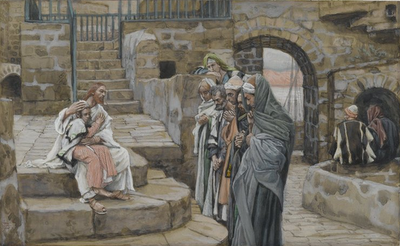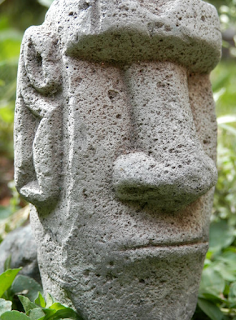 |
| "The chronicles are read to King Ahasuerus" - James Tissot |
TODAY'S SPECIAL: Esther 6:1-13
TO CHEW ON: "That night the king could not sleep. So one was commanded to bring the book of the records of the chronicles; and they were read before the king." Esther 6:1
Insomnia probably feels to you and me more like an annoyance than an evidence of God's sovereignty. Yet here God used the king's insomnia to put in motion a train of events that showed the Jewish people He was very much in charge. It started with Haman required to lead Mordecai, mounted on the king's horse) around the streets of Susa shouting, "Thus shall it be done to the man whom the king delights to honor!"
For superstitious Haman and his wife Zaresh, the meaning of Mordecai's honor at Haman's hands was also clear. Zaresh: "If Mordecai, before whom you have begun to fall, is of Jewish descent, you will not prevail against him but fall before him" - Esther 6:13.
The Bible assures us of God's sovereignty in all of human affairs in other places.
Job speaks of it in his repentance prayer:
"I know that You can do everything
And that no purpose of Yours can be withheld from You" - Job 42:2.
David buoys up his faith with this fact when he's running from Saul:
"I will cry out to God Most High,
To God who performs all things for me" - Psalm 57:2.
Do you believe that God still works for His children in such mundane ways as waking people or keeping them awake? I do. For example, I'm sure you've heard stories of people waking suddenly with the sense that someone they know is in trouble or need, spending the night hours praying for him or her, and discovering later that their wake-up call came at precisely the time the person they prayed for needed their prayers.
Let's acknowledge God's sovereignty in all the events of life—even bouts of insomnia, the need to turn back and get something we've forgotten, the wrong turn we make in the road, the rainy day that was supposed to be sunny...
PRAYER: Dear God, thank You for this example of You working through King Ahasuerus's sleeplessness. Help me to see the details of my life through eyes of faith, knowing that You put everything together with divine precision and foreknowledge. Amen.
MORE: Got Any Rivers?
An old camp chorus popped into my head as I was thinking about God's abilities this morning. Did you sing it when you were a kid?
"Got any rivers you think are uncrossable?*********
Got any mountains you can't tunnel through?
God specializes in things thought impossible
And does the things that others cannot do."
Unless otherwise noted all Scripture quotations are taken from the New King James Version®. Copyright © 1982 by Thomas Nelson, Inc. Used by permission. All rights reserved.




















